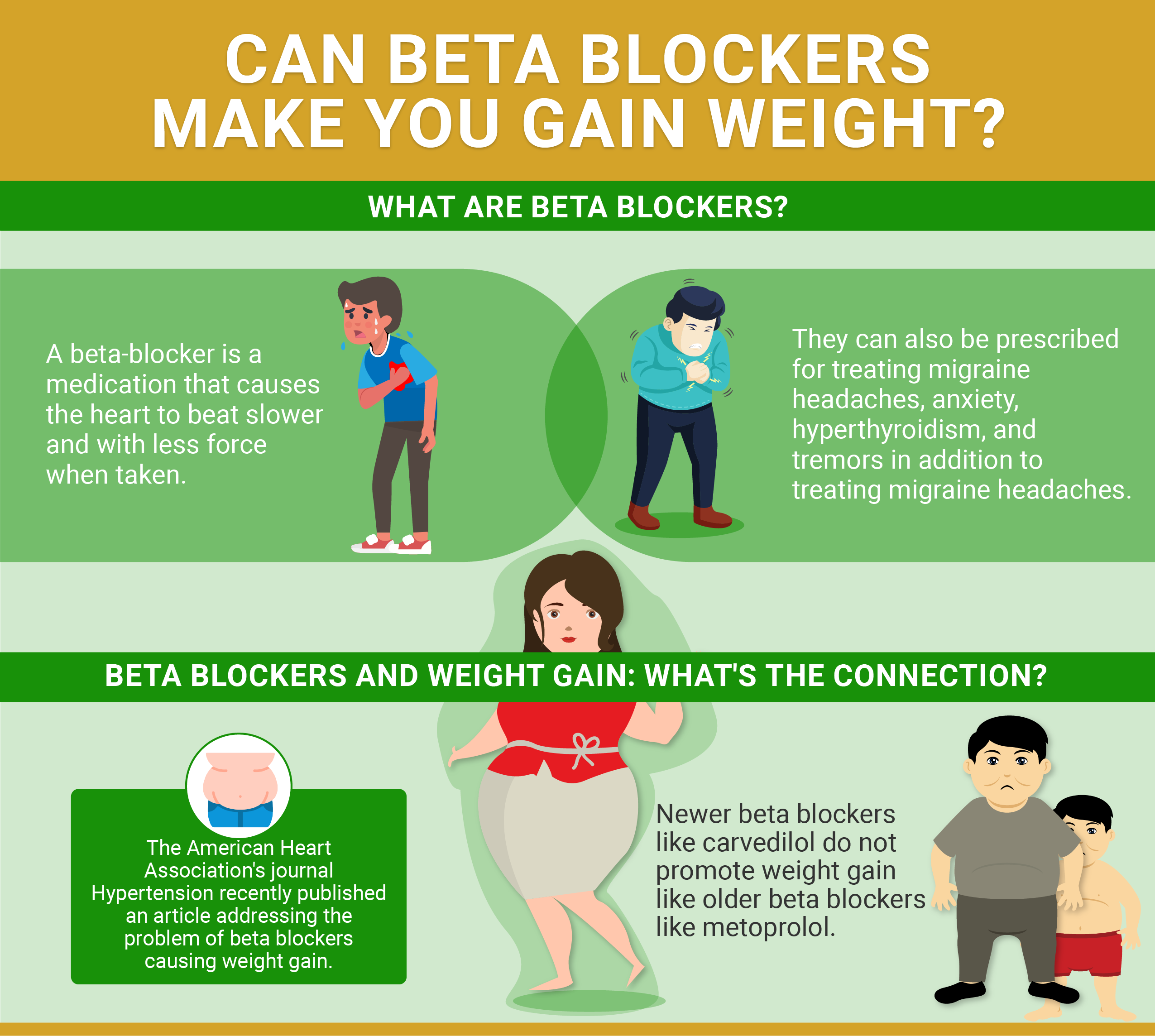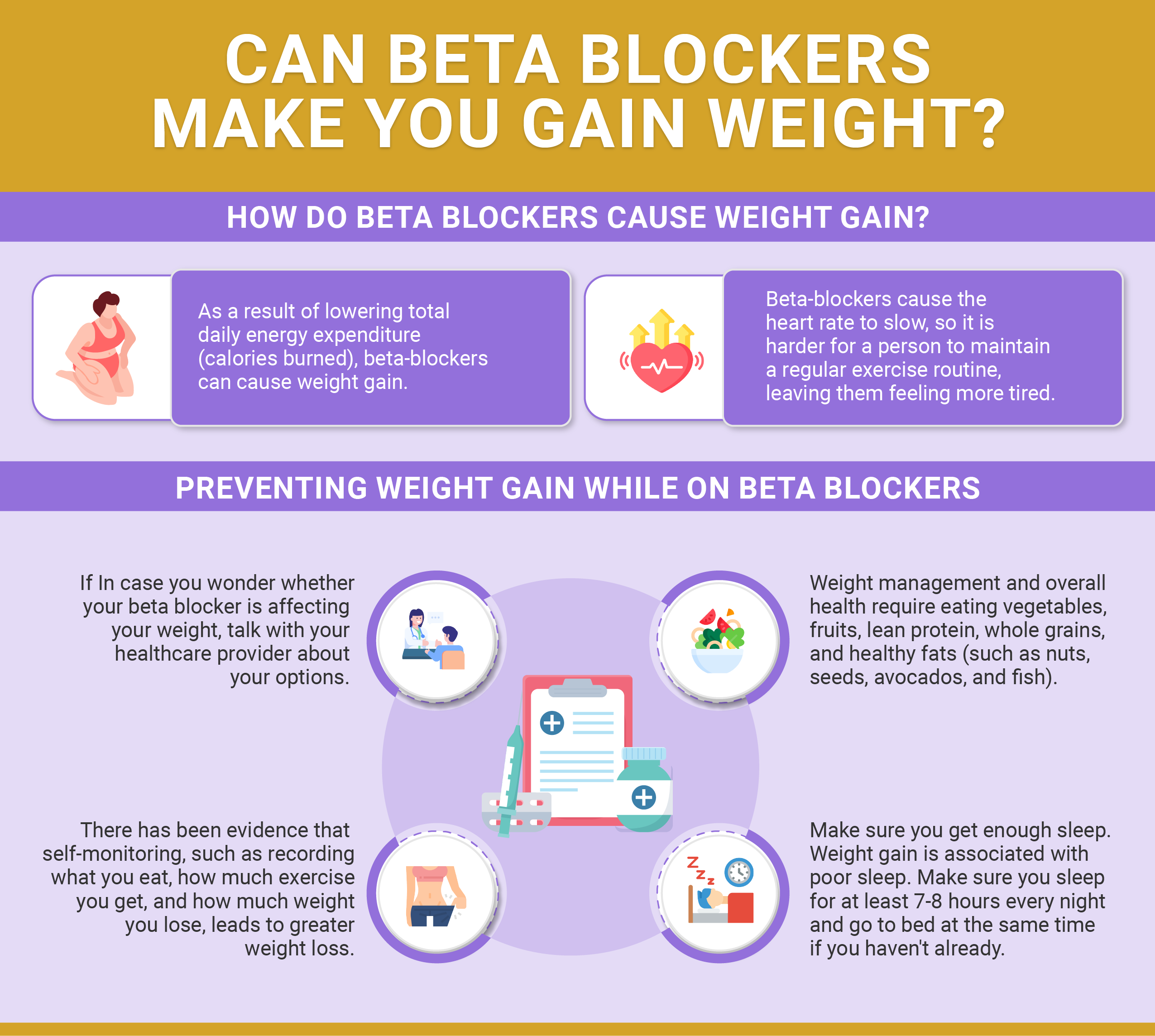Beta-blockers used for treating high blood pressure and other cardiovascular disorders dates back decades. The United States has one of the highest prescription rates for these medications. Beta-blockers are known to cause weight gain, which should be taken into consideration more carefully by prescribers. The purpose of this article is to provide you with information on how to manage weight gain when taking beta blockers.

A beta-blocker is a medication that causes the heart to beat slower and with less force when taken. Their mechanism blocks epinephrine, also known as adrenaline, from affecting the body. In addition to causing relaxation of blood vessels, some beta-blockers help to prevent blood clots. As a result of these effects, they are mainly used in the treatment of high blood pressure and other cardiovascular conditions such as heart failure and arrhythmias because of their effects on blood pressure. Furthermore, they can also be prescribed for treating migraine headaches, anxiety, hyperthyroidism, and tremors in addition to treating migraine headaches. The following are some of the most commonly prescribed beta-blockers:
The American Heart Association's journal Hypertension recently published an article addressing the problem of beta blockers causing weight gain. This side effect has been known for many years. It has been found that those taking beta blockers to treat high blood pressure tend to weigh an average of 2.6 pounds more than those who are not. Researchers observed this phenomenon across multiple studies of people taking beta blockers to treat high blood pressure. Additionally, the weight gain happened within the first few months of taking medicine. This may seem like a modest amount of weight gain, but since this was an average of 2.6 pounds, it is possible that some participants gained even more weight than others. The risk of weight gain with beta-blockers is unknown at this time.
Several studies also suggest that beta blockers may negatively impact weight loss. It has been shown in a study that those taking old beta-blockers such as metoprolol, atenolol, propranolol, and bisoprolol lose less weight than participants who take newer beta blockers or those who are not taking a beta-blocker. This study involved 160 men and women participating in diet and exercise programs. In terms of weight loss, the difference ranged between 2 and 7 per cent, which can significantly affect a person's health. It is possible to significantly reduce the risk of cardiovascular diseases by losing just 5% of your body weight, which is often the reason for beta-blocker therapy in the first place.
However, some beta blockers do not have these potential weight-related side effects. According to studies, newer beta blockers like carvedilol do not promote weight gain like older beta blockers like metoprolol. There is even evidence that these newer beta-blockers (carvedilol, nebivolol, and labetalol) may be more effective at helping patients lose weight than those not taking a beta-blocker at all, but more research is needed in this area before we can make any definitive conclusions.
As a result of lowering total daily energy expenditure (calories burned), beta-blockers can cause weight gain. Furthermore, beta-blockers cause the heart rate to slow, so it is harder for a person to maintain a regular exercise routine, leaving them feeling more tired.

It is important to remember that weight gain can also be caused by other factors when taking a beta-blocker. A sudden increase in weight can indicate worsening heart failure in people with a history of heart failure. You must notify your healthcare provider if you notice a sudden change in your weight.
If In case you wonder whether your beta blocker is affecting your weight, talk with your healthcare provider about your options. Other medications may be available to you that are less likely to cause weight gain if you only take a beta blocker to treat high blood pressure. Alternatively, you could try carvedilol or nebivolol, which have a lower risk of causing weight gain. The safest action is to consult your healthcare provider before stopping any prescribed medication.
Although beta-blockers with potential weight gain are recommended, this doesn't mean you'll lose weight or have trouble losing it. The following tips can help you achieve a healthy weight:
With Weightloss Coach, you will benefit from the experience of a Board Certified Doctor and a Registered Dietitian trained to provide reliable weight loss advice. As part of your doctor's comprehensive evaluation, your medications will be reviewed to determine if they impact your weight. Weight gain or weight loss can be made more difficult by many medications, not just beta-blockers.
The doctor will work with you and your healthcare providers to determine if your medication may be causing weight gain and if a weight-friendly alternative is available. When formulating a customized weight loss plan involving nutrition, physical activity, mindset shifts, and FDA-approved medications, your doctor and Registered Dietitian consider your medical history, including high blood pressure and cardiovascular disease. The Medical Weight Loss program at Weightloss Coach may be right for you if you seek individualized guidance toward a healthy weight.

Comments